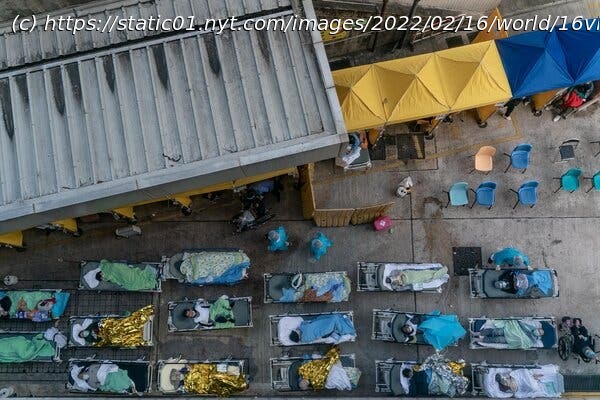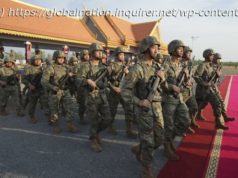An Omicron surge has exposed the weaknesses of a system that was once a world leader in containing the coronavirus.
The scenes were straight out of China’s coronavirus playbook. Armies of workers, deployed to lock down residents. Plans to erect a massive makeshift hospital. And on Wednesday, a command from Xi Jinping, the country’s top leader, plastered across local front pages: “Make controlling the epidemic as soon as possible an overwhelming priority.” The site of the latest outbreak, though, was not mainland China, but neighboring Hong Kong. And unlike on the mainland, where the government’s lofty language has been followed by quick results, no such relief is in sight. As Hong Kong sinks under its worst wave yet of the coronavirus, overwhelmed hospitals have left patients waiting on sidewalks. People have stood in testing lines that wind across parks and soccer fields. Cases are still growing exponentially, as officials opt for targeted lockdowns rather than a citywide one. Researchers have warned that by summer the latest wave could kill nearly 1,000 people — more than four times the number that have died of Covid in Hong Kong over the past two years. The city’s flailing response has exposed a crucial weakness in its ability to handle the coronavirus. Unlike other places facing a surge of the Omicron variant, Hong Kong, a semiautonomous Chinese city, cannot choose to live with the virus; Beijing continues to demand local elimination. But the city, which retains certain freedoms unheard-of in the mainland, also cannot wield Beijing’s full authoritarian tool kit or nearly unlimited manpower to stamp out transmission at any cost. Hong Kong’s leader, Carrie Lam, has struggled even to define the term that the government uses to describe its approach, “dynamic zero.” “‘Dynamic zero’ — I admit this is a policy requirement of the mainland,” she told reporters last month. “But I am not the initiator, so if you want an authoritative definition of ‘dynamic,’ I’m sorry, I really can’t explain it.” At its core, the city’s crisis reflects the limitations of its unique political model. Health experts have pointed out that certain measures, such as citywide mandatory testing, would be impractical in Hong Kong, and could also stir anger in a public already deeply distrustful of the government. But as Beijing exerts ever-tighter control over Hong Kong, through a national security law and sweeping crackdown on dissent, those considerations may start to carry less weight. Some have called Hong Kong’s willingness to embrace tougher restrictions a proxy for its loyalty to Beijing. “The loopholes and oscillation in Hong Kong’s antivirus strategy show that some officials have not met the requirements for ‘firm patriotism,’ said Tian Feilong, a law professor at Beijing’s Beihang University who studies Hong Kong. Last month, the Hong Kong government was forced to clarify that it was legal to make “general remarks and discussion” about the effectiveness of dynamic zero, after Junius Ho, a pro-Beijing lawmaker, suggested that questioning it could violate the security law.






